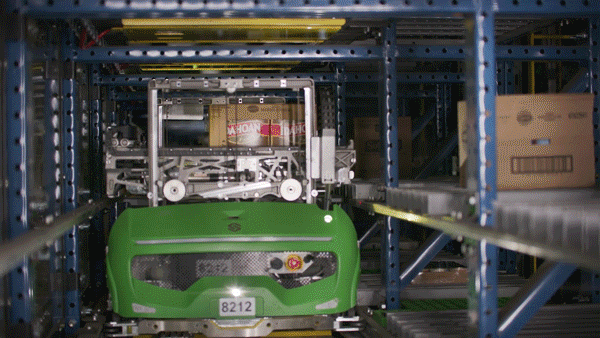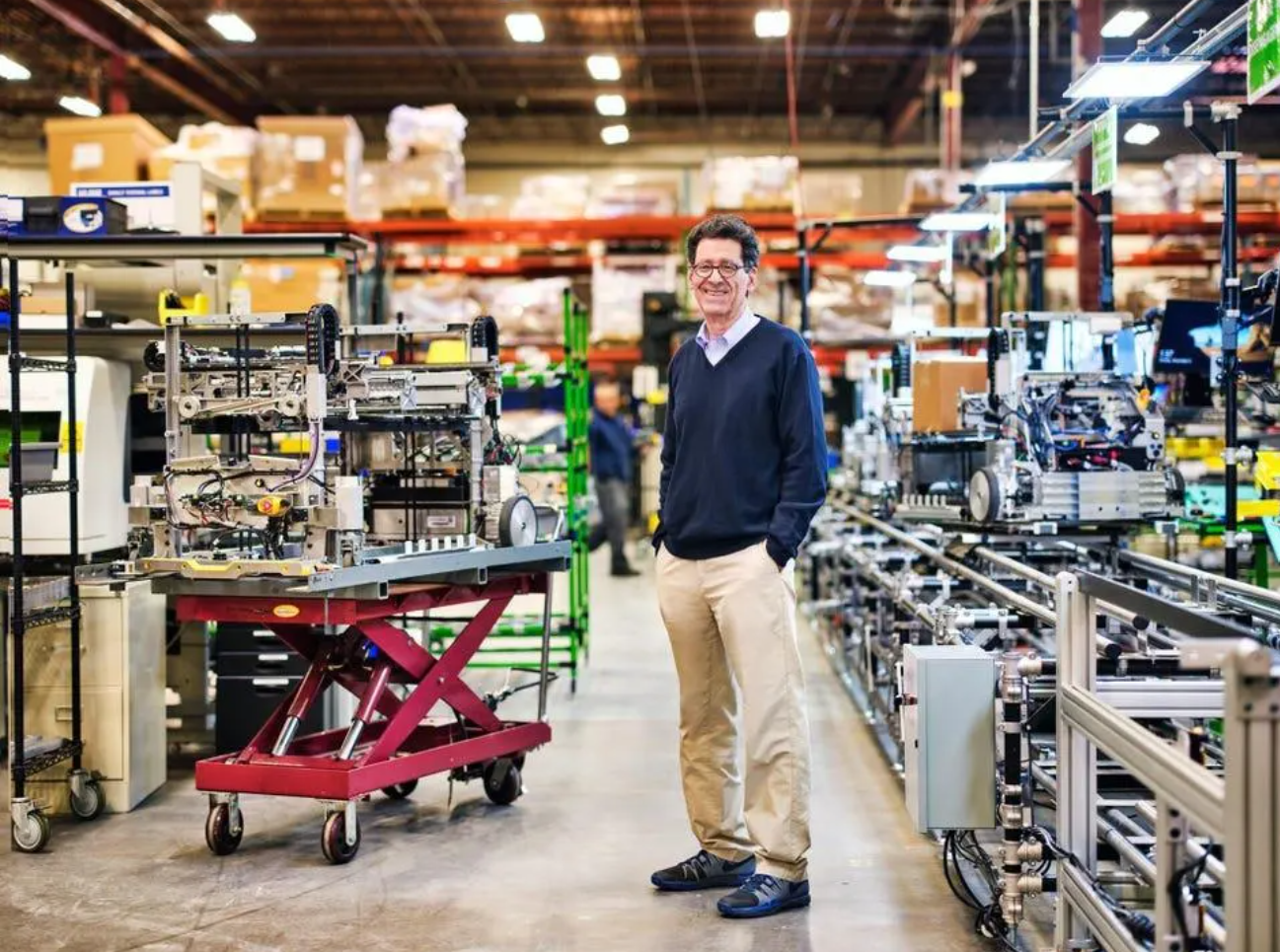Symbotic announces a $23 billion backlog of warehouse automation orders
Driving up the stock’s rise was Symbotic’s third-quarter results. The company said that its revenue reached $312 million, a 78% increase.
Shares in warehouse automation firm Symbotic soared more than 50% as the firm reported earnings today, making its billionaire majority owner, Rick Cohen, worth an extra $7 billion. Forbes real-time wealth tracker puts the net worth of Cohen and his family at $27.8 billion by day’s end, an astonishing gain that shows the strength of industrial robotics. On last year’s Forbes 400, Cohen ranked number 99, with a net worth of $7.6 billion.
While Cohen, now 70, built his family’s grocery distribution business, C&S Wholesale Grocery, into the eighth largest private company, with $33 billion in revenue, it is the warehouse automation firm that is worth a real fortune. As its stock soared today, Symbotic’s market cap reached $35 billion.
Billionaire Behind Walmart’s Warehouse Robots Gains More Than $7 Billion In A Day.
Forbes profiled Cohen, now 70, in a December 2021 feature, “Meet The Billionaire Robot Overload Reinventing Walmart’s Warehouses.” Cohen built Wilmington, Mass.-based Symbotic largely in stealth to help his own distribution issues with C&S, but by the time it went public in 2022, in a SPAC deal sponsored by venture-capital giant SoftBank, it had signed on Walmart as a customer. In May 2022, Symbotic expanded its partnership with Walmart to all 42 of the retailing giant’s distribution centers. In addition to Walmart, Symbotic’s customers include Albertsons and Target, as well as Cohen’s own C&S.
Driving up the stock’s rise was Symbotic’s third-quarter results. The company said that its revenue reached $312 million, a 78% increase over the $176 million it posted in the same period last year. It said further that it expects revenue of $290 million to $310 million for its fourth quarter, which would bring Symbotic’s annual revenue above $1 billion for the first time. While it reported a net loss of $39 million for the quarter, as it rolled out automated warehouses, it forecast positive Ebitda–of between zero and $3 million–for the first time in the fourth quarter.
In addition to its own warehouses, last week Symbotic announced that it had established a joint venture with SoftBank Group called GreenBox Systems to roll out its robotic warehouses on a rental model, allowing small- and mid-sized companies access to the technology. Symbotic (which owns 35% of that partnership) said the rollout would begin in 2024, and that it expects to bring in more than $500 million in annual recurring revenue from GreenBox once everything is operational in six years. “GreenBox is the realization of a vision I’ve had for many years to bring AI-enabled automation to companies of all sizes,” Cohen said on today’s conference call with investors.
Symbotic (formerly CasePick Systems) has a broader vision to provide innovative automation technology for customers to substantially lower operating costs by increasing storage capacity, handling throughput rate and volume.
"Symbotic is delivering the most disruptive robotic material handling solution developed specifically for the supply network," said Jim Baum, CEO of Symbotic. "Symbotic has spent the last five years developing a completely new approach to storing and handling of packaged goods that enables the distribution network to fundamentally operate more efficiently and at lower costs."
As logistics companies are facing changes and challenges in such areas as environmental sustainability and high capital for their warehouses, Symbotic believes their solution offers higher storage density, automated material handling, flexible integration, and simplified operations – all at a much lower cost. Other automated storage or warehouse solutions on the market today lack space efficiency, are highly complex, have high capital cost, and are difficult to deploy into existing infrastructure.
The Symbotic solution is a compelling alternative to traditional material handling systems. Symbotic's innovative approach to storage and retrieval uses a highly parallel network of fast autonomous robots operating in a high-density storage rack system. The solution can be easily configured to meet the customer's requirements for individual cases, automatically build pallets and store-friendly shipments.
Using disruptive and innovative technology, Symbotic uses a flexible and modular framework, autonomous robots and an integrated and intelligent software system to provide solutions that reduce costs, simplify operations, and increase storage density, all in a customer's existing supply network infrastructure. The result is an automated materials handling and storage solution that is fast and affordable to set up, inexpensive to operate and flexible to change.
Symbotic is headquartered in Wilmington, Massachusetts.
Billionaire Behind Walmart’s Warehouse Robots Gains More Than $7 Billion In A Day.
Symbotic outsources manufacturing, ceases Montreal operations
The shift is part of a broader cost-cutting plan at the robotics company.
Robotic and software manufacturer Symbotic has ceased operations at its manufacturing facility in Montreal, Quebec, and reduced manufacturing capacity at its facility in Wilmington, Massachusetts, CFO Tom Ernst said in a May 1 release.
The company will instead outsource its manufacturing, part of a broader operational restructuring plan, Ernst said in a May 1 earnings call. The outsourcing will allow Symbotic to drive system deployment growth as well as set the company up for long-term cost savings.
“During the quarter we advanced our transition to outsourcing partnerships to successfully complete installations of our current system at multiple customer sites and achieved a three-fold increase of deployments in progress since last year,” CEO and Board Chair Rick Cohen said in a statement.
The company spent $8 million on restructuring last quarter, including changes to inventory, facilities and equipment and $3 million in severance payments to just over 100 employees and 100 contractors, Ernst said.
The CFO noted that the company will begin seeing the savings benefits of the cost-cutting plan in Q3.
“We also expect that our work with these partners in terms of collaboration and communication is going to benefit our mutual operations together over time,” Cohen said during the May 1 call. “And so, this is something that we think will provide opportunity to improve our efficiency over a multi quarter timeframe rather than just a multi-week timeframe.”
As the robot manufacturer works on cutting costs, it continues to grow its distribution portfolio. Symbotic signed a commercial agreement on May 8 with wholesale distributor Associated Food Stores to implement robotic warehouse automation technology in a Utah distribution center.
The agreement is one of several Symbotic has signed over the past year. In September, it signed a deal with United Natural Foods to integrate robotics into five of its distribution centers. Last May, it expanded its work with Walmart, bringing Symbotic tech to the retailer’s 42 distribution centers.
When it comes to online speed to market, it’s been Amazon versus the world. That’s been true for a long time and will continue to be so for the foreseeable future. Plenty of factors have contributed to the Amazon’s position as a seemingly unstoppable logistics juggernaut. Among them is Amazon’s expensive decision to build automated fulfillment centers around the world. By last count, it operates 305 in the U.S. alone, with an average of 800,000 square feet.
Amazon unparalleled network of warehouses and fulfillment centers are a big part of the reason it has been able to set the standard for same and next-day delivery. Online customers from other retailers now expect their orders to be delivered within one to two days. This has now become more the standard than exception in the logistics industry. If your company can’t match it, you’re in trouble.
Softbank and Symbotic are hoping that Warehouse-as-a-Service (WaaS) can offer retailers and logistics companies a way to potentially remain competitive on that front without having to own and operate these types of expensive fully automated facilities. Very few companies have Amazon’s financial resources to purchase these systems.
Announcing GreenBox Systems
SoftBank Group today announced GreenBox Systems LLC, a joint venture with Symbotic that offers a WaaS solution to companies looking to branch out into warehouse but don’t have the money to buy them outright. Nimble announced similar plans to launch its own outsourced automated warehouses back in March.
Looking to automate every step of your supply chain? You’ve come to the right place – our one-stop automation and digitalization solutions are your ticket to the future!
SoftBank notes:
GreenBox will order Symbotic’s systems over a six-year period commencing in fiscal year 2024, to be implemented across its warehouse network in larger-scale deployments than Symbotic’s current installed base systems. Symbotic expects in excess of $500 million in annual recurring software, parts and services revenue from GreenBox once all systems are operational. Symbotic systems typically become fully operational within 24 months of project design approval.
The purchase of Symbotic robots will amount to around $7.5 billion over the contract’s life.
“GreenBox taps into the powerful potential of A.I. and other enabling technologies in supply chains, while also making the benefits of automation accessible to more businesses through an ‘as-a-service’ offering,” SoftBank’s Vikas J. Parekh said in a release. “In partnership with Symbotic, GreenBox will equip customers with more intelligent, streamlined, and scalable warehousing solutions while eliminating the burden of major capital expenditures.”
SoftBank owns 65% of the company to Symbotic’s 35%. The news also arrives as SoftBank announced that it has purchased 17.8 million shares of Symbotic. The Massachusetts-based firm is far from the biggest name in warehouse robotics, but the company has already drummed up some high-profile deals. Last May, Walmart announced that it was deploying Symbotic systems in its centers across the U.S.
The company employs a multi-facets approach to warehouse automation, including Kiva-like autonomous mobile robots, coupled with arms that can pick, place and depalletize. With SoftBank’s help, it went public via SPAC in June 2022.




